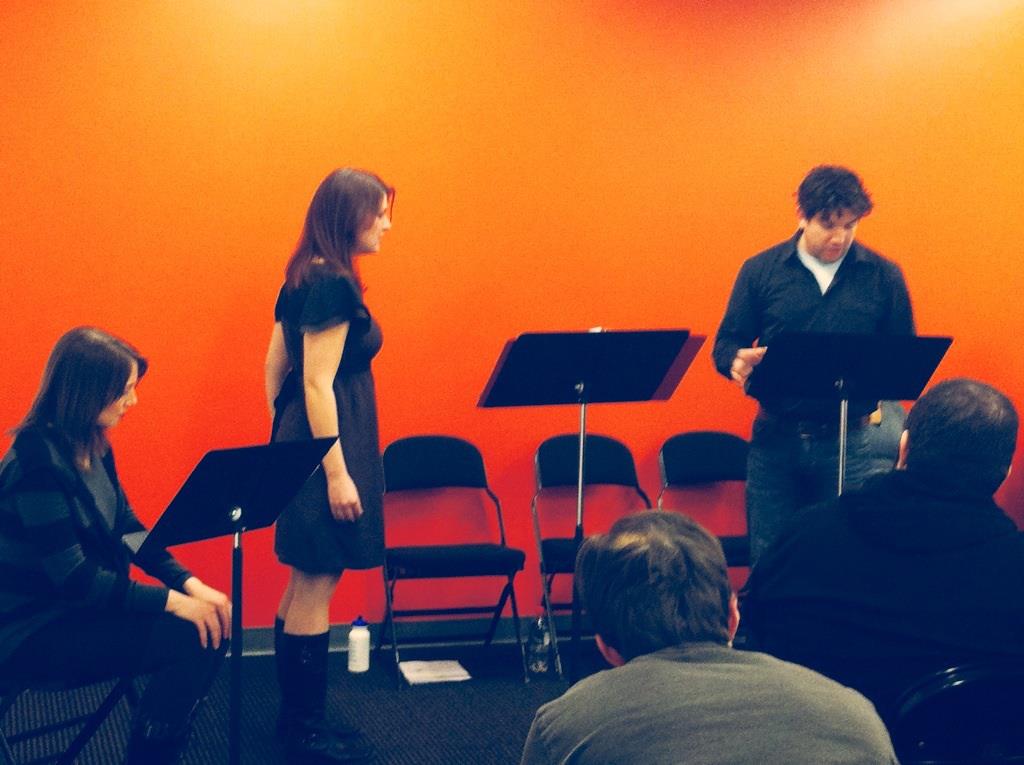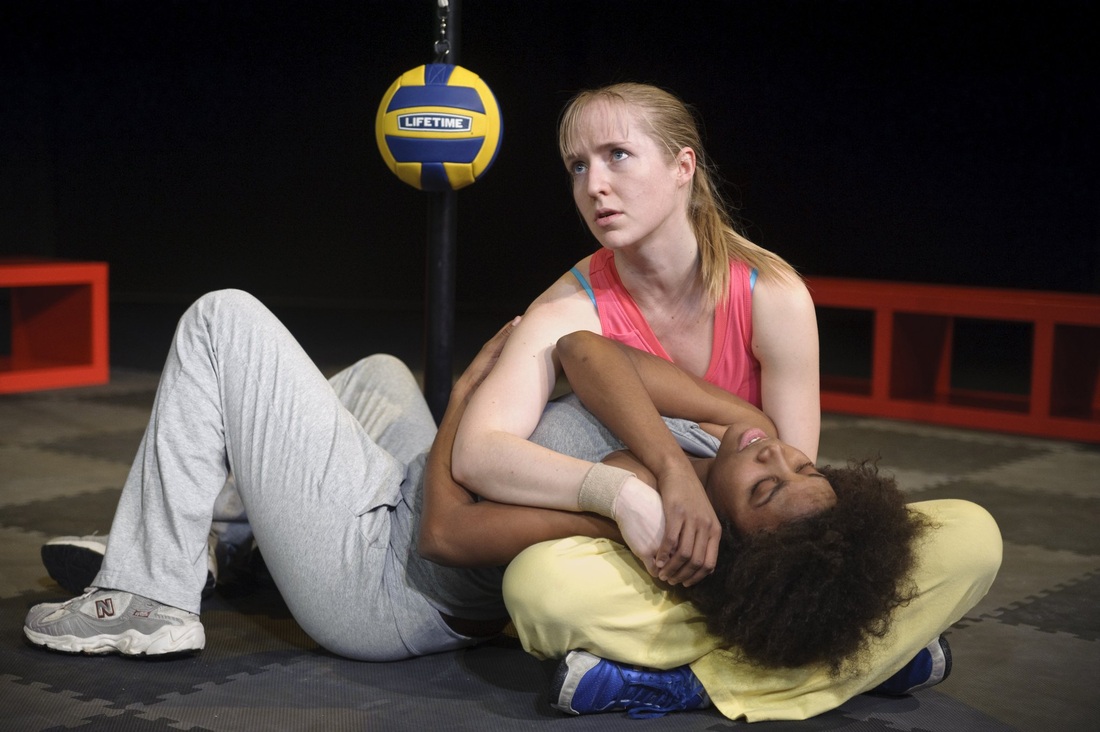|
JACQUELINE LAWTON: Why did you decide to get into theatre? Was there someone or a particular show that inspired you?
JENN BOOK HASELSWERDT: If I had to pinpoint a particular show, it would—embarrassingly—have to be Annie. I saw an amateur production when I was five years old or so, and I remember thinking, “Well, shoot. If they can do that, I can do that!” I was very fortunate to have had a series of encouraging adults throughout my youth, beginning with my parents of course, then Mrs. Blum, my second grade teacher, who let me stay in during recess to write scripts on her typewriter; Mrs. Powell, my fourth grade teacher, who always let me read the fiction I’d written out loud to the class (and gave me constructive criticism); Ms. Schmidt, my middle-school drama club teacher, who helped me explore Gore Vidal and the psyche of the Wicked Witch of the West; my high school teachers, Mr. Shovlin and Mr. Vogelman, who took everything I knew about theatre and turned it on its head, forcing and encouraging me to examine what made theatre theatre. JL: How do you define dramaturgy? Or explain to people the work that you do? JBH: My husband lives in another professional world (political science), and one of his colleagues put it pretty succinctly: “Oh, so you’re a script consultant?” In this political and legal environment, people understand what a consultant does—everyone’s a consultant in DC, right—so a lot of the time, I go with that. I think that dramaturgical work is different for every process. Most of what I do is new play development, so I read scripts, talk with playwrights about the questions they’d like to answer through an exploratory process, and help them find answers to those questions. In production dramaturgy, I’ve done research into the world of the play, in order to help the actors and directors understand time period, conflicts, etc. I think that at its core, dramaturgy is about helping the other artists present the best version of the playwright’s vision. (And that’s what’s important: the playwright’s vision.) JL: How long have you lived and worked as a dramaturg in DC? What brought you here? Why have you stayed? JBH: I moved to DC in 1997 to get my degree in theatre at American University. I thought I wanted to be an actor, but really reveled into the research I found essential to creating believable characters. (When I played Nurse Ratched in One Flew Over the Cuckoo’s Nest, I got a time-period-appropriate version of the psychology Diagnostic and Statistical Manual, and diagnosed each of the characters for myself. Not because I was assigned to, just because I wanted to.) And I loved getting actor packets. Devoured them. When I was about 23, in the same week, my roommate told us she was moving out to take the literary management internship at GEVA, and a friend of mine got the role as the daughter in Mamma Mia on Broadway. I was jealous of the budding dramaturg, and congratulated the actress. And then I had to take a step back and examine that gut reaction: maybe what I really wanted to do was dramaturgy! So, I went to get my degree in dramaturgy at CUA, and I’ve been doing it ever since. I’ve stayed in DC for a few reasons: first, because my family is here. And secondly, I find that the DC area has some of the most amazingly creative collaborators I could have hoped to find. The community is so nurturing. JL: If your work as a dramaturg doesn’t pay the bills, what else do you do? How do you balance this work with your dramaturgy? JBH: My full-time job is also in theatre: I’m the Education Program Manager at Imagination Stage. In addition to a lot of administrative work that helps the education department run smoothly, I also get to teach three to six Creative Drama classes a week, in addition to work in arts integration. It’s a great way to help stretch my creative muscles. I also get to bring my son to classes, which is a fantastic perk! My professional life is education during the day, dramaturgy at night. JL: What skills and traits do you feel a successful dramaturg should have to support the development of a new play or a production? JBH: I think that at their core, dramaturgs need to have an inquisitive spirit. This carries through both new play development and research dramaturgy. You have to love the journey, and to accept that finding answers might lead you down a rabbit hole to more questions. JL: What is the greatest part of being a dramaturg? What has been your most difficult challenge? JBH: I get paid to read scripts and be a nerd and talk to people about those things! That is awesome! In retrospect, that’s been my dream my whole life. My most difficult challenge has been with playwrights who seem less interested in collaboration, and more interested in just hearing their words read aloud. I think there’s absolutely value in hearing actors read a script, but if you don’t want to be asked questions—and that’s my process, I don’t give statements unless specifically asked for them—then, you can probably just ask some friends to come over to your house and read. I put a lot of thought into the questions I ask, and how to direct a conversation around a table, and when the process is met with shrugs instead of exploration, it’s tough. JL: Who are your favorite playwrights? What is it about their work that inspires or draws you to them? JBH: Strangely enough, the first name that popped into my head was Stephen Sondheim. And he’s not a playwright! But his lyrics are so complex, his storytelling techniques so diverse, his rhyme schemes and rhythms so evocative. I’ve been reading his books Finishing the Hat and Look, I Made a Hat recently, and they’re filled with theatre history, criticism, and writing tips. It’s also very interesting to read about how he worked with his various collaborators, and what his revision process is. For proper playwrights, I’m continually intrigued by Maria Irene Fornes’s use of language and magical realism, Caryl Churchill’s variety of female voices, and Christopher Durang’s humor and absurdity. JL: DC audiences are ... JBH: Attentive consumers of theatre and information. They’re eager to read, watch, and talk. JL: DC actors, designers and directors are … JBH: Amazing collaborators with smart questions. I’m constantly astounded at the dramaturgical minds around the development table, regardless of what position folks were hired for. JL: DC playwrights are … JBH: Eager and conversant. I’m excited to be able to get in on the ground floor with submissions, and to talk with both emerging and established playwrights about their work. JL: DC critics are ... JBH: Increasingly easy to talk to and understand. The advent of social media has (for better or worse) forced people to talk to each other, rather than putting critics on a pedestal. I find Twitter conversations with folks like Peter Marks particularly interesting. JL: How do you feel the DC theatre community has addressed the issues of race and gender parity? How has this particular issue impacted you and your ability to get your work produced on the main stages? JBH: I think that the DC theatre community is becoming more and more aware of the race and gender biases that have been rampant in American theatre. It’s a dialogue that I’m thrilled has started, but that needs to trickle down (or up?) into more actual practice. I’m thrilled that The Inkwell—where I spend the majority of my dramaturgical time—has made a real effort to work with diverse playwrights, and plays where we can hire diverse actors both racially and along gender lines. Our most recent showcase featured the work of three female playwrights. JL: What advice do you have for an up and coming DC based dramaturg who has just moved to D.C.? JBH: See everything! One of the best things I did for myself was to become a Helen Hayes judge. What an awesome opportunity to see a wide and diverse amount of theatre. I was able to refine my aesthetic, but also to learn to put what I liked aside and talk about plays objectively. That’s a great skill to learn. Talk to everyone! At The Inkwell, we’re working with upcoming dramaturgs through our Shadow program, putting emerging artists in a room with established artists, to engage in a development process. Talk to us; we’d love to meet you! JL: What's next for you? Where can we keep up with your work? JBH: In March, I’ll be dramaturging The Inkwell’s InkReading of Steve Moulds’s The Body. I’m so excited about this reading—I had the opportunity to dramaturg a 20-minute showcase reading of the play two years ago, and it’s awesome to work with Steve again, and to dive into the full script. Later this year, I’ll be working with two pieces in Theatre J’s Locally Grown Festival, in addition to dramaturging the six one-acts in the DC Queer Theatre Festival. You can keep up with my work on my website: www.jbhdrama.com.
0 Comments
Your comment will be posted after it is approved.
Leave a Reply. |
My BlogI'm a playwright, dramaturg, and teaching artist. It is here where you'll find my queries and musings on life, theater and the world. My posts advocate for diversity, inclusion, and equity in the American Theatre and updates on my own work. Please enjoy!
Categories
All
Archives
June 2020
Reading List
|



